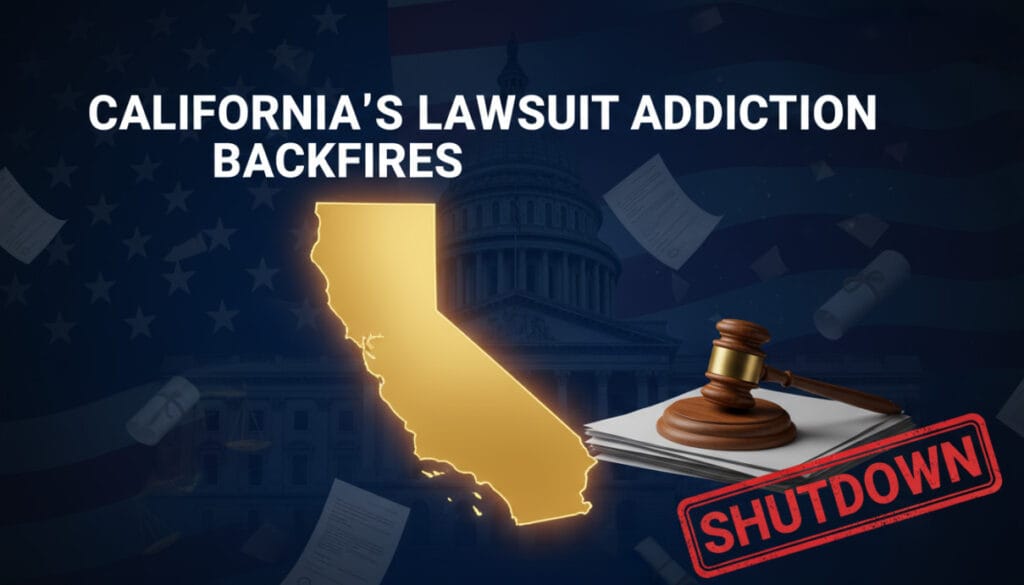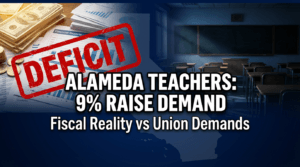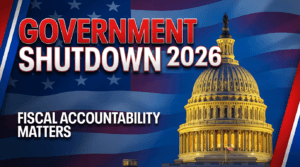California’s Lawsuit Addiction Backfires: Federal Shutdown Exposes Golden State’s Wasteful Legal Strategy


When Legal Warfare Meets Reality
For years, California has positioned itself as the “resistance” to conservative policies, launching lawsuit after lawsuit against federal initiatives. Now, in a twist of ironic justice, the very federal government they’ve been attacking has inadvertently exposed the Golden State’s reckless legal strategy. The current federal shutdown has stalled multiple California lawsuits against the Trump administration, revealing just how dependent the state has become on expensive, taxpayer-funded legal warfare instead of focusing on governing.
This development offers a stark lesson in fiscal responsibility and the dangers of allowing political grandstanding to override sound governance. While California burns through millions in legal fees pursuing partisan battles, real issues like homelessness, infrastructure decay, and public safety continue to plague residents who deserve better from their elected officials.
The Price Tag of Political Theater
Millions Wasted on Endless Litigation
California’s addiction to federal lawsuits represents one of the most egregious examples of fiscal irresponsibility in modern state governance. Since 2017, the Golden State has filed over 120 lawsuits against federal policies, with legal costs mounting into the tens of millions of dollars. These aren’t emergency legal challenges protecting constitutional rights—they’re calculated political moves designed to generate headlines and satisfy the progressive base.
The LA Times reports that the federal shutdown is now stalling “several lawsuits between California and the Trump administration,” with Justice Department officials requesting delays across multiple cases. This revelation exposes the sheer volume of simultaneous legal battles California has been pursuing, each one requiring substantial resources, attorney time, and court costs that ultimately fall on taxpayers.
Opportunity Cost: What California Isn’t Fixing
While state attorneys burn the midnight oil crafting anti-federal lawsuits, California’s real problems continue to fester. The state faces a homelessness crisis that has turned major cities into open-air drug markets, infrastructure so deteriorated that basic services are failing, and a cost of living so extreme that middle-class families are fleeing to other states.
Every dollar spent on politically motivated litigation is a dollar not invested in roads, schools, public safety, or programs that actually improve Californians’ daily lives. This represents a fundamental failure of fiscal accountability and priority-setting that conservative principles of limited government and responsible spending directly address.
The Federal Government Strikes Back
Constitutional Authority vs. State Overreach
The current situation perfectly illustrates the proper relationship between federal and state authority. When California officials announced plans to sue over the potential use of the Insurrection Act and cross-state National Guard deployments, they revealed their fundamental misunderstanding of constitutional federalism.
The federal government has clear constitutional authority over national security, interstate commerce, and federal law enforcement. California’s reflexive opposition to federal authority represents not principled resistance, but dangerous overreach that undermines the rule of law and constitutional order that conservatives have long defended.
The Shutdown as Unintended Consequence
The federal shutdown’s impact on California’s lawsuits demonstrates how the state’s strategy was built on a foundation of federal cooperation—the very system they claim to oppose. By flooding federal courts with politically motivated cases, California created a dependency on the smooth functioning of federal bureaucracy to process their complaints.
This ironic twist reveals the hollow nature of California’s “resistance” posture. True independence would involve focusing on state-level solutions and governance rather than constantly seeking federal court intervention to block policies democratically enacted at the national level.
Governor Newsom’s Misplaced Priorities
Political Grandstanding Over Governance
Governor Gavin Newsom’s response to recent federal actions—announcing plans to sue the government and urging Americans to “speak out against Trump’s breathtaking abuse of power”—exemplifies everything wrong with California’s approach to governance. Instead of focusing on solutions to state problems, Newsom positions himself as a national resistance leader, using state resources for personal political ambitions.
This grandstanding represents a betrayal of the conservative principle that elected officials should focus on their actual job: serving their constituents’ immediate needs. California voters didn’t elect Newsom to be a national political figure; they elected him to govern California effectively.
The Veterans Housing Contradiction
Ironically, while announcing lawsuits against federal authority, Newsom simultaneously celebrated new veterans housing funding through Proposition 1. This contradiction highlights the selective nature of California’s federal opposition—they’ll gladly accept federal cooperation when it serves their political interests while attacking federal authority when it doesn’t align with progressive priorities.
Conservative governance would involve consistent principles applied fairly, not cherry-picking federal relationships based on political convenience.
The Real Cost to California Families
Taxpayer Burden of Legal Warfare
California families struggling with inflation, housing costs, and economic uncertainty deserve to know that their tax dollars are being spent on essential services, not political theater. The millions spent on anti-federal lawsuits represent resources that could fund teacher salaries, road repairs, or public safety improvements.
This misallocation of resources violates basic conservative principles of fiscal responsibility and limited government. State governments should focus on core functions—education, infrastructure, public safety—rather than engaging in expensive political battles that provide no tangible benefit to residents.
The Accountability Gap
The federal shutdown’s impact on California’s lawsuits also reveals a concerning lack of accountability in state government. How many lawsuits is California pursuing simultaneously? What are the total costs? What metrics determine success or failure? These questions remain largely unanswered, suggesting a legal strategy driven more by political impulse than careful planning.
Conservative governance demands transparency, measurable outcomes, and clear accountability for public spending. California’s approach fails on all these fronts.
A Better Path Forward
Focusing on Core Responsibilities
California could learn valuable lessons from conservative governance principles. Instead of waging legal warfare against federal policies, the state should focus on areas where it can make real improvements: streamlining regulations that drive up housing costs, improving education outcomes, addressing homelessness through effective programs rather than endless spending, and creating conditions for economic growth.
Constructive Federalism
Rather than reflexive opposition to federal authority, California could engage in constructive federalism—working within the constitutional framework to advance state interests while respecting federal prerogatives. This approach would be more effective, less expensive, and more respectful of democratic processes.
Conclusion: Learning from Failure
The federal shutdown’s impact on California’s anti-Trump lawsuit strategy offers a teachable moment about the dangers of allowing political ideology to override sound governance principles. When state resources are diverted from essential functions to fund political theater, everyone loses—except the politicians and lawyers who benefit from the chaos.
California’s residents deserve leadership that prioritizes their immediate needs over national political ambitions. They deserve fiscal responsibility over legal grandstanding. Most importantly, they deserve government that works for them, not against the constitutional order that protects everyone’s rights.
The Golden State’s lawsuit addiction has been exposed as both financially reckless and strategically flawed. Perhaps this moment of forced pause will encourage reflection on what state government should actually be doing: governing effectively, spending responsibly, and serving constituents rather than political movements.
Call to Action
Stay informed about government accountability in your state. Share this article to help others understand how political lawfare wastes taxpayer resources. Contact your representatives to demand transparency about legal spending and priorities that focus on real solutions rather than political theater. The future of responsible governance depends on citizens who hold their leaders accountable for both their spending and their priorities.












